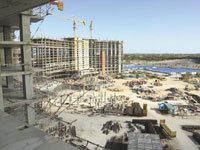 For years, it seemed the Baha Mar hotel-casino in the Bahamas was doomed.
For years, it seemed the Baha Mar hotel-casino in the Bahamas was doomed.
The project, planned for a 1,000-acre parcel with a prime beachfront location in Nassau City, spent much of the past decade having falling-outs with different financing opportunities and management teams.
Caesars Entertainment Corp., when the company was known as Harrah’s Entertainment, signed on to manage the development in 2007.
Within a year, however, the casino operator was out of the picture.
Gaming has been legal since 1969 in the Bahamas, a one-time British colony encompassing thousands of large and small islands, some less than 60 miles from Florida’s southeastern coast.
The best-known tourist destination is the Atlantis Paradise Island resort. The hotel property has a casino, but Atlantis is more famous for its multiple family-friendly aquatic activities.
Baha Mar hoped to change that image. But without financial backing, the site was nothing more than a dream.
“Baha Mar is more of a luxury destination that will capture the essence of Bahamian culture,” SK+G Advertising Senior Vice President Jim Gentleman said earlier this year.
The Las Vegas-based marketing company was brought in to advertise and create the image of Baha Mar after the project’s savior emerged from China.
In 2010, China’s Export-Import Bank agreed to arrange financing to complete the $3.5 billion development.
Baha Mar includes four hotels totaling 2,200 rooms surrounding a 100,000-square-foot casino, restaurants, retail, entertainment and an 18-hole championship golf course designed by famed golfer Jack Nicklaus.
Beijing’s state-owned construction company – China Construction Engineering Corp. – signed on to build the project.
The construction company built the “Water Cube,” the nickname for the National Aquatics Center that was used in the 2008 Beijing Olympics, and the City of Dreams hotel and casino complex on Macau’s Cotai Strip.
With the project well under way and targeting a late 2014 opening, Baha Mar officials are making the rounds to alert the gaming world the Bahamian development is moving forward.
“This will be a resort equal or better to any property found in Las Vegas or Atlantic City,” said Uri Clinton, the general counsel for Baha Mar Ltd.
Clinton, 40, grew up in Las Vegas. He became familiar with the Baha Mar project when he worked as the vice president of legal affairs for Caesars’ central division.
After leaving Caesars, Clinton was general counsel for slot machine manufacturer Multimedia Games, helping the company gain license approvals in several jurisdictions, including Nevada.
Clinton was interested in international business opportunities, and Baha Mar came into focus again.
The Bahamas is in the process of rewriting the country’s gambling regulations with a more modern structure.
When completed, the country will have Nevada-style gaming regulations allowing for sports wagering, mobile gaming and Internet gaming.
All the changes should be in place by the time Baha Mar welcomes its first customers.
“This is a unique market and Baha Mar will allow the Bahamas to grow its gaming by offering a true Las Vegas experience,” Clinton said.
Baha Mar will have four hotels – the Baha Mar hotel, a Rosewood Hotel, a Mondrian and a Grand Hyatt – in addition to 307 high-end private residences and villas.
Construction crews redeveloped and reinforced the beach area to give the resort a half-mile of white sand waterfront.
Baha Mar also paid the costs to redevelop the highway and roads into the project, which will be a 10-minute drive from the international airport at the nation’s capital, Nassau, where $400 million in upgrades are nearly complete.
The Bahamas is a two-hour plane flight from New York and other Eastern U.S. cities. Baha Mar hopes to drive visitation from those markets, as well as Latin America and other foreign destinations.
Clinton said the casino, which is planned for 1,500 slot machines and 150 table games, could draw weekend visitors who might otherwise go to Atlantic City or other regional gaming destinations.
For the entire article, click here.
By Howard Stutz
Las Vegas Review-Journal



